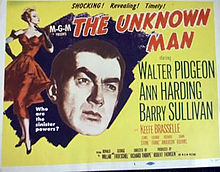
THE UNKNOWN MAN
US, 1951, 86 minutes, Black and white.
Walter Pidgeon, Ann Harding, Barry Sullivan, Keefe Brasselle, Lewis Stone, Eduard Franz, Richard Anderson, Dawn Addams, Philip Ober, Mari Blanchard.
Directed by Richard Thorpe.
The Unknown Man is a strong courtroom drama of 1951. It is quite a moralising film insofar as the central character is caught up in a moral dilemma that involves principles and matters of life and death. With its brief running time, perhaps it does not have the opportunity to develop the moral dilemma more fully but it presents it in a strong manner, especially when audiences identify with Walter Pidgeon.
Pidgeon portrays a lawyer who is not skilled in defence cases. Challenged, he takes up the case of a young criminal, played by Keefe Brasselle, and using a technique that was later used in Twelve Angry Men (the witness needing glasses to see clearly), he wins an acquittal. The film’s tone shifts when it is clear that the young man was actually guilty, and is employed by the Mr Big of crime in the city.
Pidgeon is a very strong and upright screen presence, grappling with the dilemma, his respect for the law, for justice – eventually sacrificing himself for his principles. Barry Sullivan gives another strong performance as the district attorney, the kind of performance he offered in many films (and was very similar in the 1959 The Purple Gang). There is a very good supporting cast including Lewis Stone as the sympathetic judge, Eduard Franz as the head of the crime commission. There are cameo appearances by Ann Harding as Pidgeon’s wife, Richard Anderson and Dawn Addams as well as Mari Blanchard in early roles. Direction is by Richard Thorpe who made many action films at MGM, soon after this making Ivanhoe, Quentin Durward and The Knights of the Round Table.
1. A 50s moral drama, civic corruption, protection, law and justice, integrity?
2. Black and white photography, the contemporary city, ordinary streets and life, affluent circles? Stores, courts, district attorney’s office, prisons? The musical score?
3. The strong cast, MGM values?
4. The voice-over, Jack and his explanations, the introduction to Brad Masen? Jack as tough, DA, the perspective of the law, information about the characters, the court? The final decisions and Jack’s final speech?
5. The importance of law, the relationship between law and justice? The administration of law, the police and the courts? The penalties for breaking the law?
6. The information about the law commission, the visit to the store, the robbery, the murder of the young man, the father’s grief?
7. The introduction to Brad, his age, his respect for his father and his role in the law, his son and his law studies (and the help from his fiancée)? Love for his wife? Seeing her at the store, the fashion model, the dress for the social? His love for the law, aloof from criminal law? The invitation, his friends? The discussion about the law commission, the invitation for him to be a member? His thinking this over?
8. The visit, the discussions with the judge, with the DA? The issue of Rudi and his being innocent? His friend Kellwin visiting him, explaining the case? The challenge to Masen? The decision to defend him? His not being skilled in defence techniques? The judge, presiding, urging Masen on? The witness, the issue of the glasses and what the father could see? The argument of the case, the DA's response, Rudi in the court? The not guilty verdict? The jury decision, the dead man’s father accosting Brad outside the courtroom?
9. Brad, the verdict, success, the encounter with the father, being uncomfortable? Discussions with his wife? His decision to visit Rudi, seeing the model, his friend, Rudi’s change of manner? His suspicions?
10. The visit to the father, talking things over, wanting to help him, his having the key? The discovery of the protection racket, his interviewing the other shopkeepers? Their unwillingness to testify?
11. His going to Rudi’s room, discovering the rapier, taking the laundry note, taking the weapon? The phone call, his listening in, Rudi’s appointment? His going to visit Layford? Their discussions, the visitor, the noise in the background, his realisation of the truth? Layford as head of the crime commission, the Mr Big, his hypocrisy, their talking hypothetically, Masen’s impulse, self-righteous, killing Layford?
12. His conscience, explaining the situation to his wife? Going to the DA? Rudi’s arrest, the weapon? His decision to defend Rudi, the talk in court about the unknown man, the other man, Masen and his giving the detail – hypothetically, but realistically?
13. Rudi, in court, the verdict?
14. Masen and his talking to the DA, permission to visit Rudi, the revelation of the truth to Rudi, the knife and his taking it, Rudi killing him? Masen sacrificing himself for justice? The fact that Rudi was guilty of murder? The arrest?
15. The DA's final speech, the graduation, the son and his fiancée at the ceremony? The DA and his praising of Masen’s sense of justice and integrity?
16. A film like this as providing a basis for a moral case and discussions about moral issues of justice, law and integrity?